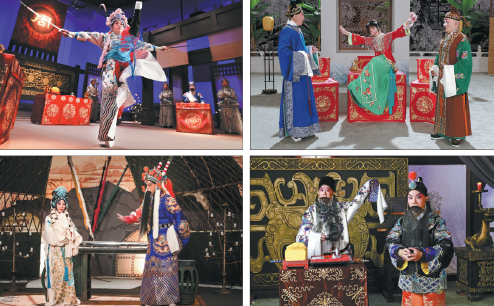
Life丨Peking Opera classics get modern touch
2023-05-16 16:18
For more than two centuries, Peking Opera has mesmerized audiences with its captivating performances and stunning vocal artistry, earning it a place as one of China's most significant cultural treasures. To preserve and promote the iconic legacy, the Peking Opera Film Project, entering its 13th year, has released four cinematic remakes of classics.

The new movies — Silang Visits His Mother, The Gathering of Heroes: Borrowing the East Wind, The You Sisters of the Red Chamber, and Cai Wenji Returns to Her Homeland — were shown on April 25, a day after the China National Film Museum added them to its collection.
Ma Chongjie, who learned opera as a child, shifted his interest to the film industry after graduating from the directing department of the Beijing Film Academy. He has worked as a director at the China Film Group Corp for more than 30 years, serving as helmsman for around 20 movies, most of which have been inspired by traditional operas or remakes of them.
"I was born into a family of Peking Opera performers, so I have had a special affection for this art form since childhood," says the veteran filmmaker, who has directed four of the 21 features so far produced by the Peking Opera Film Project.
With support from State authorities, the project has brought together masters and emerging talent from the country's top Peking Opera troupes, creatively blending modern cinematography with the centuries-old art form to appeal to younger audiences.
His third movie for the project — after The Orphan of Zhao and Xie Yaohuan — Silang Visits His Mother casts a group of established Peking Opera artists, such as actor Zhang Jianfeng and actress Dou Xiaoxuan, to retell a legend set during the Northern Song Dynasty (960-1127).
The tale, which originated in the 16th century, tells the story of Yang Yanhui, nicknamed Silang, the fourth son of a renowned general. He is captured and forced to marry the daughter of Empress Dowager Xiao, his enemy and a powerful ruler from the Liao Dynasty (916-1125). Fifteen years later, the protagonist discovers that his long-separated mother has succeeded his late father as the new leader of a Northern Song army, so he decides to risk his life and escape the Liao palace to reunite with his family.
"The play is one of the earliest Peking Opera classics and has been staged many times over the past century, with most Peking Opera masters putting their own unique spin on it. When I was first tasked with directing this movie, I felt quite stressed," recalls Ma Chongjie.
On the project, which took an excess of eight months to complete, the director used advanced filming techniques, such as virtual cinematography, to combine traditional stage performance with special effects. In doing so, he brought to life this ancient tale, which also touches on themes of wartime romance.
"Usually, die-hard fans who often visit opera theaters primarily listen to their favorite plays, rather than watch them, as they are already familiar with the lyrics and lines," says Ma Chongjie. "By using visual effects to fill in the gaps in the imagination, these Peking Opera movies will draw more attention to the settings and close-ups, adding another layer of significance."
Adapted from the classic novel Romance of the Three Kingdoms, written by Luo Guanzhong in the 14th century, the film weaves together the tales of how Zhou Yu and Zhuge Liang, two military strategists from allied powers engaged in the wars following the collapse of the Eastern Han Dynasty (25-220), defeat their enemies during a decisive battle in Chibi, located in what is now Central China's Hubei province.
According to Ma Chongjie, the movie uses computer-generated imagery to bring to life various battlefield scenes, ranging from the surging waters of the Yangtze River to an onslaught with thousands of arrows.
Ma Chongjie regards the movie — with its sprinkling of prestigious artists aged between 60 and 84 — as the most challenging undertaking of his directorial career.
"This play has been passed down for more than 200 years, encapsulating the artistic contributions of many different masters from various schools. In 1957, it was adapted into a movie, featuring seven masters of that era," explains Ma Chongjie, emphasizing the pressure of seeking breakthroughs while retaining traditional nuances.
Although most Peking Opera tales tell stories of royalty and high-ranking officials, The You Sisters of the Red Chamber, created by the late master Xun Huisheng in 1932, shifts the focus to two ordinary women and their everyday struggles.
With veteran Peking Opera artist Liu Changyu, 81, serving as the movie's art consultant, the film retells a well-known story from the classic novel Dream of the Red Chamber, written by Cao Xueqin of the Qing Dynasty (1644-1911), about two beautiful sisters surnamed You who struggle to pursue love but both face tragedy.
"Most Peking Opera stories draw upon traditional Chinese culture and reflect the unique values, aesthetics and moral pursuits of the Chinese nation," says Liu. "Through film, we can better pass on the art of Peking Opera and allow more people, including locals in far-flung rural areas and Chinese soldiers guarding the borders, to experience it."
Reporter: Xu Fan








